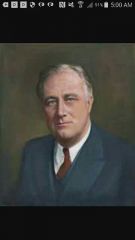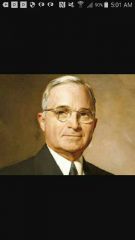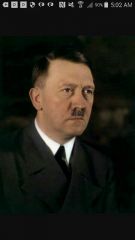![]()
![]()
![]()
Use LEFT and RIGHT arrow keys to navigate between flashcards;
Use UP and DOWN arrow keys to flip the card;
H to show hint;
A reads text to speech;
29 Cards in this Set
- Front
- Back
|
Yalta Conference |
Established the United Nations organizations after the war. |
|
|
Axis |
Japan, Germany, and Italy. |
|
|
Allies |
United States, Great Britain, and the Soviet Union. |
|
|
Joseph Stalin |
Soviet Union Dictator and stated there would be no free elections in countries freed by the Soviet Union. |
|
|
Winston Churchill |
Prime Minister and Leader of Great Britain. |
|

Franklin D. Roosevelt |
President of USA during most of ww2. |
|

Harry Truman |
President of USA at the end of ww2 who decided to drop atomic bombs on Japan. |
|
|
Hiroshima and Nagasaki |
Cities bombed by atomic weapons. |
|

Adolf Hitler |
German Dictator and Leader of the Nazi party. |
|
|
Mussolini |
Italian Dictator- executed at the end of ww2. |
|
|
Philippines |
Country invaded by the Japanese. |
|
|
Holocaust |
Ethnic cleaning- called genocide- Hitler led the holocaust. |
|
|
Partisan |
Resistance fighters. |
|
|
Blitzkrieg |
Form of warfare that used tank divisions supported by airplanes. |
|
|
A.G.G.R.E.S.S.I.O.N. |
Causes of ww2- Hitler's belief in superior Aryan nation, Treaty of Versailles, and invasion in Rhineland and no one objected. |
|
|
United Nations |
Allies agreed to the United Nations at the Yalta Conference. |
|
|
Rhineland |
Hitler moved to Rhineland and no one objected. |
|
|
D-Day |
Stands for Deployment Day. |
|
|
Kamikaze |
Japanese pilots who went on suicide missions. |
|
|
Normandy Beach |
Although severe casualties the invasion of Normandy Beach was considered an allied success. |
|
|
Potsdam Conference |
Truman wanted free elections and Stalin said it wouldn't be allowed. |
|
|
Nazi/NADP |
National Socialist German Worker's Party-NSDP. |
|
|
Cold War |
Period of political tension following ww2. |
|
|
Pearl Harbor |
On Dec. 7, 1941, the Japanese surprise attacked the U.S Fleet and brought U.S into ww2. |
|
|
Einsatzgruppen |
A special strike force that seemed to slow so the Nazi built special extermination camps in Poland. |
|
|
Himmler |
Leader of the S.S. |
|
|
Pacific and Europe |
Two main areas or theatres of ww2 operations. |
|
|
Atomic Bomb |
Truman believed using atomic weapons on Japan would help U.S. avoid heavy casualties. |
|
|
Aryan |
The race Hitler believed was the master race. |

